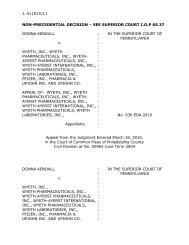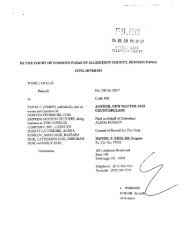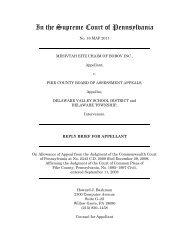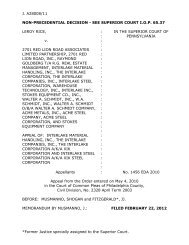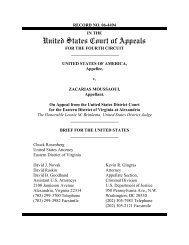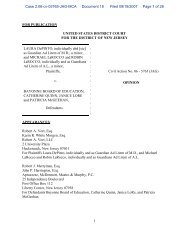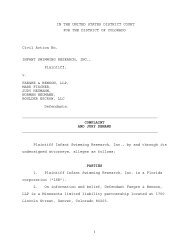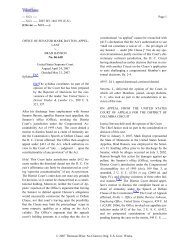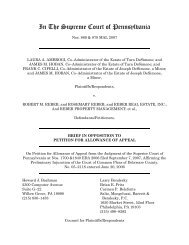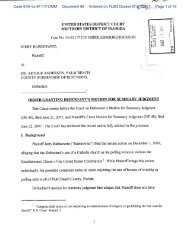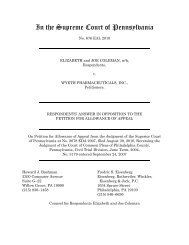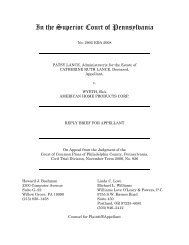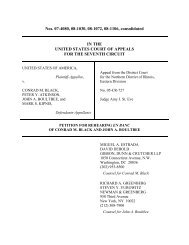Stone v. Bear, Stearns & Co., Inc. - How Appealing
Stone v. Bear, Stearns & Co., Inc. - How Appealing
Stone v. Bear, Stearns & Co., Inc. - How Appealing
Create successful ePaper yourself
Turn your PDF publications into a flip-book with our unique Google optimized e-Paper software.
circumstances, one of which is “evident partiality” by the arbitrator(s)). Before deciding whether<br />
Marston’s alleged failure to disclose evidences “evident partiality” against <strong>Stone</strong>, we must first<br />
determine what “evident partiality” means. This is no easy task, as the parties (and the courts)<br />
disagree on the appropriate standard. Respondents, relying on an oft-cited footnote from the Third<br />
Circuit’s 1994 opinion in Kaplan v. First Options of Chicago, <strong>Inc</strong>., 19 F.3d 1503, argue for a stringent<br />
“evident partiality” standard which would make it more difficult for us to vacate the award:<br />
In order to show “evident partiality,” “the challenging party must show ‘a<br />
reasonable person would have to conclude that the arbitrator was partial’ to the<br />
other party to the arbitration.” Apperson v. Fleet Carrier <strong>Co</strong>rp., 879 F.2d 1344,<br />
1358 (6th Cir.1989) (quotation omitted), cert. denied, 495 U.S. 947 (1990).<br />
“Evident partiality” is strong language and requires proof of circumstances<br />
“powerfully suggestive of bias.” Merit Ins. <strong>Co</strong>. v. Leatherby Ins. <strong>Co</strong>., 714 F.2d<br />
673, 681-82 (7th Cir.), cert. denied, 464 U.S. 1009 (1983), mandate modified, 728<br />
F.2d 943 (7th Cir.1984).<br />
Kaplan, 19 F.3d at 1523 n.30 (emphasis added).<br />
For present purposes, we label this the “actual bias” standard.<br />
On the other hand, <strong>Stone</strong>, relying on Justice Black’s forty-year-old opinion in <strong>Co</strong>mmonwealth<br />
<strong>Co</strong>atings <strong>Co</strong>rp. v. <strong>Co</strong>ntinental Casualty <strong>Co</strong>., 393 U.S. 145 (1968), contends that we should vacate an<br />
arbitration award whenever an arbitrator fails to “disclose to the parties any dealings that might create<br />
an impression of possible bias.” Id. at 149 (emphasis added). We label this the “appearance of bias”<br />
standard. This formulation of “evident partiality” undoubtedly favors those seeking to overturn<br />
arbitration awards, as the universe of non-disclosures that “might create an impression of possible<br />
bias” is quite large. The Third Circuit has recognized but not yet resolved this apparent conflict in<br />
the law. See HSM <strong>Co</strong>nstr. Servs., <strong>Inc</strong>. v. MDC Sys., <strong>Inc</strong>., 239 Fed. App’x 748, 752-53 (3d Cir. 2007)<br />
(non-precedential).<br />
Case 2:11-cv-05118-LDD Document 22 Filed 05/29/12 Page 12 of 35<br />
12



